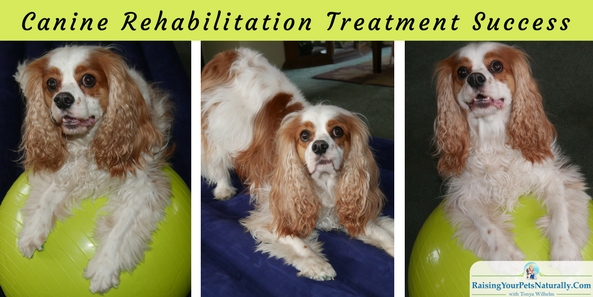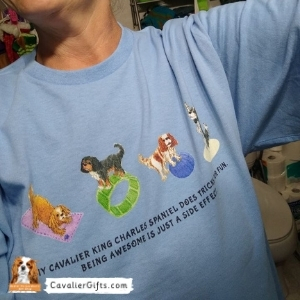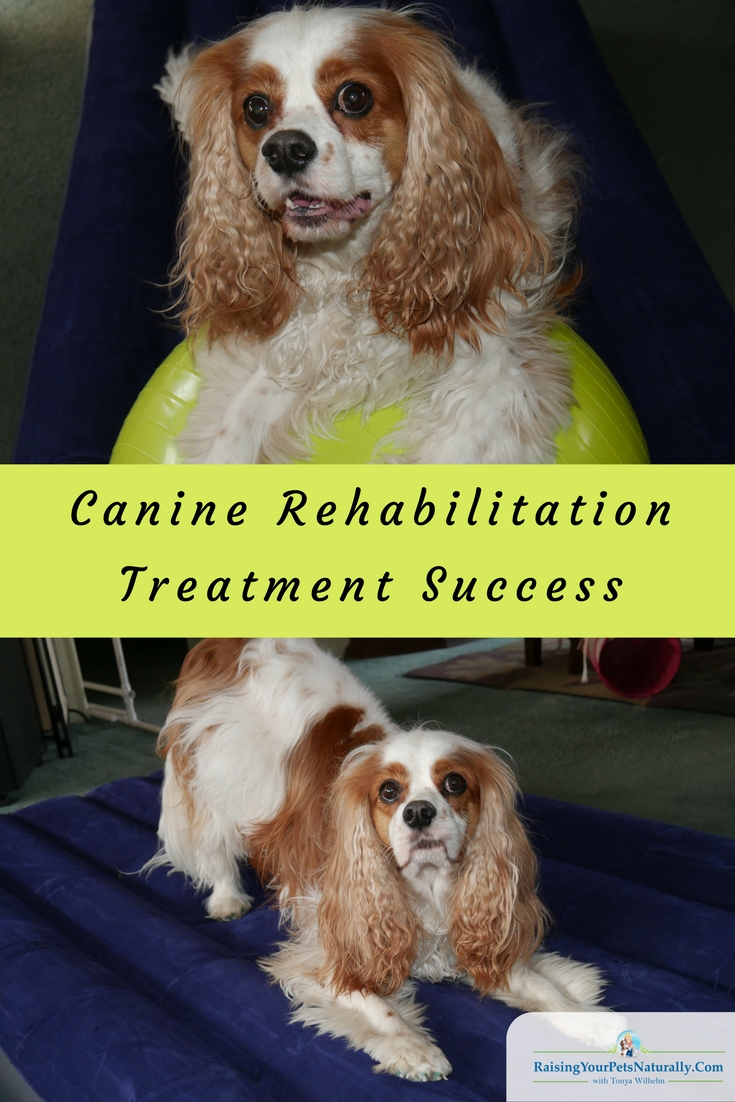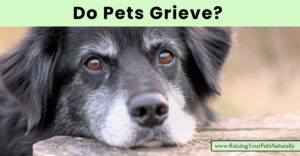Google Adsense—>

Canine Rehabilitation Centers and Treatment Success
An Interview with Dr. Mary L. Cardeccia founder of Animal Rehabilitation Facility (located in Dexter, Michigan)

For my followers already familiar with my blog, you know that Dexter The Dog is battling some serious medical conditions. For my new fans, a little fill-in may be necessary. My seven-year-old Cavalier King Charles Spaniel, Dexter, was diagnosed with Chiari malformation (CM) and syringomyelia (SM) just before his third birthday. CM is basically when the skull is too small to hold the brain, causing pressure on the cerebellum and medulla, and obstructing normal flow of cerebrospinal fluid. You can compare this to holding your finger over half of the opening of a hose; that pressure then causes fluid-filled cavities within the spinal cord, SM. This is a very painful, progressive and incurable disease in both dogs and humans.
I provide Dexter a variety of natural solutions including food therapy, herbs, supplements, monitoring his exercise, and unfortunately, some pharmaceuticals. This past year I’ve noticed Dexter “shuffling” his back feet instead of picking them up. Dexter is not picking his back feet up properly due to his lack of conscious proprioception. This is a lack of awareness he is getting from his back feet to his brain, likely due to his neurological condition. About five months back, Dexter started wearing Dr. Buzby’s ToeGrips for Dogs to help (read how). He has had improvement and his toes are not nearly as worn as before the ToeGrips.
But now, he’s starting to do a little head bopping and wobbling. I felt it was time to look into what else I could do to help improve the quality of Dexter’s life. I reached out to one of Dexter’s holistic veterinarians, Dr. Mary L. Cardeccia. Dr. Cardeccia focuses on animal rehabilitation and natural healing methods including acupuncture, food therapy, chiropractic, Reiki, and herbology. We both agreed that there were more natural rehabilitation exercises and work I could be doing with Dexter to improve his conscious proprioception and to hopefully help decrease his head bobbing and wobbles (back end weakness).
I’ve been taking Dexter to Dr. Cardeccia weekly for the past 6 weeks and working daily at home with some of his canine rehabilitation exercises. I will go into more detail in future blogs, but today I wanted to do a little Q & A with Dr. Cardeccia on exactly what we are doing and why. Hopefully, this article will reach other pet parents who may find themselves in a similar situation and help them know that there is hope and that as pet parents we have a lot of natural options to help improve our pet’s lives. We must always be our pet’s advocate and keep looking and searching for solutions.
Watch the video interview and don’t forget to subscribe!
I’m the kind of person who wants to know more than just what to do, I try to find out the why and how. I feel this allows me to get a better understanding of what is going on and to continue to make the best choices about Dexter’s care accordingly.
I asked Dr. Cardeccia how and why Dexter’s neurological condition makes him drag his back feet vs picking them up properly.
“Because with the SM there is pressure on his spinal cord (from the pockets cerebrospinal fluid that form within the spinal cord near the brain) it is interfering with the nerves of proprioception, which are on the outer portion of the spinal cord. Proprioception is the internal sense that tells you where your body parts are without your having to look at them, so he is not actually fully aware of where his feet are, and that is why he drags them.”
What is the purpose of doing his footwork? What is it doing?
“The footwork is to help retrain the nerves of proprioception so that he will be more aware of his feet. Some of it can also help to strengthen his core muscles, which will further improve his balance. This is why we want him to go slowly when he is doing these types of exercises. Even if the pressure on his spinal cord is now resolved, if it was there for long enough, the nerves will still be compromised and we need to remind them of what their job is.”
Watch a few rehab samples and don’t forget to subscribe to the vlog!
Do we have an end in sight for Dexter’s rehab exercises, or will we need to practice these exercises for life?
“I think a little bit of both. It is our hope that by doing the rehabilitation exercises with him, we will improve his current level of function and get him up to a new plateau; however, given that he has a chronic underlying condition, doing some of the proprioception and core strengthening exercises with him on an ongoing basis will likely help to maintain him at a higher level of function long term.”
During Dexter’s first evaluation, Dr. Cardeccia found a pulled groin muscle. I asked her to explain a little about her thoughts on why he pulled his muscle.
“Dexter strained his iliopsoas muscle, which is made up of the psoas and iliacus muscles. Between them, they run from the upper lumbar region (just behind his rib cage) along the underside of his vertebrae and pelvis, and attach at the top of his inner thigh. This is a major core muscle, flexing the hip and spine, and is easy to strain when you are having balance issues and having to accommodate for them. He also may have splayed out on the floor at some point if he slipped, which is a common way to ‘pull’ this muscle. In Dexter’s case, I think that he strained the iliopsoas (groin) muscle opposite his weaker leg since he was taking over more of the weight bearing and steering with his ‘good’ side.”
One of the main focuses with Dexter’s canine rehabilitation exercises is to build his core strength. Dr. Cardeccia explains why this is so important.
“Since Dexter is having some issues with balance and not being fully aware of where his hind feet are, including core strengthening in his program will help to improve his balance and ability to adapt, even if for some reason we were not able to get him to actually be any more aware of where his hind feet are. This core strength will help him not to lose his balance as often, and allows him to accommodate for the occasional loss of balance more easily.”
Quick Demo on Exercise Disc. Live in my Facebook Group. You can also subscribe to my YouTube channel for more!
Dexter has a variety of core strength exercises that he can do on a twice daily basis. I asked her if there is a difference between the exercises. For example, is the larger ball vs. smaller ball vs. working on an air mattresses.
“Some of the core exercises are focusing on different muscle groups, or using them in different ways. For example, standing on or walking across the air mattress focuses more on his abdominal and back muscles in general, while putting his front feet up on a balance ball focuses more on the muscles of his lower abdomen/back and hind legs. Using a taller ball or less stable ball increases the difficulty of the exercise. By having him do a variety of different exercises we are hoping to maximize the effect of his program in improving his balance and mobility.”
Dr. Cardeccia wanted to start Dexter on the canine water treadmill. Her animal rehabilitation facility also offers pool therapy, so I asked her why she chose the treadmill vs. the pool for Dexter.
“While hydrotherapy in either a pool or underwater treadmill can be of benefit in a strengthening program, with Dex I am focused on getting him more aware of where those hind feet are as well. Exaggerating his gait while walking through the water serves double duty; it strengthens his legs and core, as well as helping to improve his proprioception. In addition, I chose the UWTM as our goal is to improve his daily function, and a swimming gait pattern is different that a walking gait pattern. Therefore, using the UWTM is more logical if we are retraining gait in a neurological patient.”
Watch Dexter’s first water therapy treatment and don’t forget to subscribe to the vlog!
When Dexter feels good, he is a very playful and frisky dog. However, it was during his play that I would see more of his head bobs and hind end weakness. I thought it was imperative to ask Dr. Cardeccia what activities he should avoid and why.
“For now, we want to limit his activities if he is struggling with the coordination to successfully accomplish them. For example, if he is scrambling to find his footing when playing ball, he may injure himself as he rushes to get it if he loses control of his feet and splays out on the floor, or takes a tumble. It is not that he is necessarily going to make his SM symptoms worse, as much as that he is likely to injure something else because he is not in control of his body.”
I’m very lucky with Dexter and his confidence. He is always eager to try new things and tackles new things with gusto. As a dog trainer, I am continually working with puppies and working on confidence boosting games including walking on new textures, wobbly surfaces, and novel equipment.
I asked her if Dexter’s canine rehabilitation exercises would be suitable for puppies.
“In general, yes, using exercises to improve balance and proprioception can be very good for puppies, no matter what their future “job” will be. Helping puppies to be more body aware can prevent injuries in sporting of working dogs as adults, and the balance and proprioception exercises are low impact so could be safe for puppies who are still growing. Of course, you would want to consult with your veterinarian before starting any rigorous exercise program for your dog.”
Over the last six weeks, I’ve seen a huge improvement in Dexter’s energy and spunk. This proves to me that these exercises and treatments are working. We also had proof in the pudding when Dr. Cardeccia measured his muscle mass. Previously, his one back thigh was smaller and weaker than the other. Now, at his follow-up, they both are larger, and more importantly, his weaker leg has caught up with the other! That is amazing news! I am just so tickled with Dexter’s improvement—this little boy means the world to me. I can’t thank Dr. Cardeccia and her team at Animal Rehabilitation Facility (located in Dexter, Michigan) enough for helping my little boy improve his quality of life. <3
- More on keeping your dog mobile
- Find a TCVM Veternarian
- Canine Rehabilitation Institute
- University of Tennesse Canine Rehabilitation
Have you taken any of your pets through rehab? Tell me in the comments.
Are you looking for even more ways to stay up to date with Raising Your Pets Naturally? Sign up for the newsletter for more tips and promotions. Don’t forget to be social and Like, Follow and Subscribe. Comments below are always welcome.
Facebook Twitter Pinterest Instagram YouTube
 |
 |





A very interesting read! Sorry to hear that Dexter is having some troubles. It sounds like you’ve got a great doctor though! How awesome that you have seen improvement since he’s been doing the recommended exercises and treatments! Sending purrs and prayers that he continues to improve!
Thank you so much. Dexter is very lucky to have a team of specialists guiding him and me. I appreciate the warm wishes and purrs.
I’m so sorry that you and Dexter are dealing with this terrible disease. He’s really lucky to have you advocating for him and making sure he gets the best treatment and therapy possible. I loved the exercise videos as well. I’ve been doing rehab exercises with my dog Roxie, who had leg surgery 8 weeks ago. I may have to add some of these to her rehab routine as well. One question.. what size exercise ball are you using? I’ve been wanting to get one, but I only seem to find the really large ones. Thanks and keep up the great work you two!
Thank you. We have a variety of balls and they provide different functions for him. I’d ask your rehab vet what size would be best for your needs. Or, maybe even shoot Dr. Mary a message. Here is a link to a few different sizes. http://amzn.to/2njODDy
Thanks for sharing this great information! Very interesting to read.
Thanks, Nichole. Hopefully, it will help other pets and their humans.
I’m so sorry to hear you’re dealing with this and hope Dexter’s spunk and energy continues to come back. Great questions though and such an interesting read. I think knowing the ‘how’ and the ‘why’ can give us a lot of piece of mind when dealing with complex health issues.
Thanks. I agree. By having a better understanding of what is going on, I think it helps us make the best choices. <3
This is such a horrible condition which could be prevented all together with responsible breeding
Actually, they are trying to figure that out. It’s sooo far down their genes, it’s been difficult. A handful of breeders are now doing MRIs to the breeding dogs. Dexter actually came from an exceptional breeder, but genetics just are what they are.
Wonderful article! I was surprised to see the yoga ball being used for dog rehab. We use these as chairs in my office! Good to know they’re not just good for humans.
Yes, used for a lot of doggie therapies and even dog sports! You just need to make sure it’s the anti burst ones.
We are so sorry you are dealing with all this but are blessed to have found such an amazing vet, we have been following you on this journey and amazed at how his spunk has come back.
<3 Thank you. Me too. When I think back to when he was diagnosed I thought it was the end. Then, with the help of Dr. Mary and Dr. Judy, Dexter is back. He loves life and wants to keep active. He has a very active soul.
Sorry to hear about what’s been going on with Dexter, but I can’t imagine him being in any more capable hands. The commitment you show and the care you give him is incredible, if only more people showed that same level of love and compassion to their own animals.
Thank you. You are going to make me cry. Dexter is an amazing boy and I can’t imagine not going to the ends of the earth for him.
Having a good and sensible vet is critical when dealing with major issues. You have a good vet and I know Dexter is a real fighter!
GO Dexter, you can do this!!!
Thank you. We are very lucky to have a nice team of caring doctors on Dexter’s side.
Awee was that actually Dexter making those whiny sounds in the interview video? LOL Too cute. What a wonderful doctor you have for Dexter! I also love the obstacle course you sat up for him (second video) I am going to do that for our Lyla!
Dexter is such a beautiful pup and you are a wonderful doggie mama!
<3 Thank you. Yes, that was Dexter squeaking as we call it. He does that around people he really likes. Lyla will love an obstacle course. I will be writing more on his exercises later.
Well, mom thought she was going through a lot with Taffy but after reading this she knows that there are others that have a lot more to deal with like Dexter. It sounds like he has a long and challenging road ahead but he is getting the best care available. Love Dolly
Aw, thanks, Dolly. It doesn’t matter what the stress, all stress affects us. Cheering for you and Taffy.
Ugh… my 4 year old Shih Tzu Was just diagnosed with this last week and I am beside myself trying to help her. The neurologist and medical team tell me one thing, the holistic groups tell me something else. I took her to a holistic vet but unfortunately, they didn’t really offer much help. Any advice you can offer would be greatly appreciated.
HI, Shar. So sorry to hear. It can be tough. There is a group I linked above. I would sign up for that group. Very helpful. It can be a challenge to find a vet that understands this disease. I will continue to share Dexter’s journey and what I do for him. This post has a lot of information. https://raisingyourpetsnaturally.com/syringomyelia-in-dogs/ Hugs
I’ve been keeping tabs on developments with Dexter, and I’m so glad that you’ve gotten some comprehensive answers from your knowledgeable veterinarian. What an amazing resource! I’m so glad she was willing to share the how and why to many of your questions.
Please keep up posted on how Dexter is doing. In the meantime, please know we’re thinking of you.
Thank, you Bryn. <3 I really appreciate all our friends and followers cheering us on. It means a lot.
Thank you for sharing Dexter’s journey. I’m so sorry you both have to experience this… I am glad to hear that you are seeing improvement. I found the interview very interesting and it’s so good to have a great vet. My Gibson had epilepsy, and I, too, was fortunate to have an amazing vet team. Gib also did rehab, actually was in a constant state of rehab for the last several years. Thank you again for sharing his journey and bringing awareness to this condition. Stay strong, Dexter!
Thank you. You are right, great vets are everything. You have been such an inspiration with Gib’s story. Thank you for sharing your journey with him too.
I know it must be difficult, but I admire what you are doing for Dexter. It sounds like you’ve found a wonderful vet.
Thank you. Dexter is my world. I am so thankful to have such a great vet team.
Excellent excellent, a lot to learn (and admire) from the PT!
Thanks
This is so amazing to me. I’ve never had to do rehab with any of my pets so this is all new to me. Dexter has been through so much, I’m glad to see he has shown so much improvement and appears to have a great doctor – not to mention a wonderfully tenacious Mom, willing to move heaven & earth for him!
Love & Biscuits,
Dogs Luv Us and We Luv Them
<3 Awe, thanks. Dexter is my world.
This is so great to hear. I had no idea there was rehab for dogs, but if we ever get another one and he needs it, it’s good to know it’s an option.
Thank you. Luckily, we have a lot of options for our pets. It’s fantastic that we continue to learn about their needs and people and veterinarians step up and help them. Amazing, really.
Gosh poor Dexter, I am so glad that you have seen some improvement and I hope you continue to do so. x
Yes, we continue to see improvement and he is pretty darn frisky and active considering. He loves life and I plan on keeping it that way.
I have never heard of a place like this! My dog is much older now (18 year old labrador) so she isn’t getting around as much. Wonder if she would be able to do some of those exercises?
18 is amazing! Obviously, check with your vet, especially at that age. There is a couple of links at the end of this post about finding a qualified rehab vet. I also just posted a top 5 product for senior or less active dogs. You might take a look. <3 https://raisingyourpetsnaturally.com/special-needs-or-less-active-dogs
I’m so glad you found something that helps Dexter. It’s wonderful that he’s improving!
Thanks. Yes, it does my heart good. He’s just the best dog and I want him to continue to live his happy life.
A very interesting read! . I loved the exercise videos as well. I’ve been doing rehab exercises with my dog oreo. Thank you for sharing your journey with him too.
Thanks. I hope Oreo has a good rehab too. I will be doing more videos and lessons on our specific exercises in the near future.
I don’t own a pet, but I do work at a vet school and this is something I watch our veterinarians and professors do often with our dogs. It’s so lovely to see them getting the support they need.
That is so cool! I wish you the best of luck in your career!
I had no idea you could take your dog to rehab classes. When my Colt was a pup, he would constantly hurt himself, but he grew out of that.
So glad Colt is doing well. I teach puppy classes and we use various pieces of equipment to teach puppies confidence and to learn body awareness. It helps prevent injury.
What a fascinating interview. I awlays like finding out more about things like this.
Thank you. I enjoy learning new things too. It was nice to really sit down with Dexter’s doc to get the full idea of what and why we were doing what we are doing for Dexter’s care.
It’s so sad to hear about what’s been going on with Dexter, but I’m sure he’ll get better soon. The love & commitment you show is incredible.
Thanks. Luckily, rehab has drastically improved his wobbles and he’s doing quite well.
It is a big burden for you to take care of the poor dexter. What a blessing for him to have you. I also have four cats and a dog. For us, our animals are also our children. Great blog. And all the best for you and Dexter.
Thanks. We also have 2 cats. Luckily, Dexter is so amazing it never is a burden, but I understand what you mean.
Good to see Dexter improving with time. You’ve been super supportive. That’s awesome!
Thanks. He’s doing amazing, he’s my little rock star.
I am so sorry, to hear that dexter is poorly. I am also so grateful that he is getting the medical attention and care needed to help him have a better life.
Thanks. Dexter is such a happy boy. He’s so fun and frisky now that he’s doing better. Rehab has totally changed his life.
I’m glad you were able to get some answers to your questions about Dexter’s condition! It’s good to hear that rehabilitation has been such a help!
Thanks. I am so fortunate to be surrounded by amazing veterinarians that are pulling for us and providing us with such great care. I’d be lost without them.
Sorry to hear about Dexter and also about the suffering you are going through, but you have got awesome doctor.
Thanks. Luckily Dexter makes my life very happy and complete. We live life to the fullest every day. <3
Dexter is such a cutie, sorry you are going through this. We have a wiener dog and we thought we were going to have to go to rehab because he injured his back but it was just bruised.
Thanks. So sorry to hear about your wiener dog. I love those guys! I just posted a top 5 for senior or less active dogs with a product a lot of weiners can use-WiggleLess If you have a moment, check it out. https://raisingyourpetsnaturally.com/special-needs-or-less-active-dogs/
It’s great that you’ve been able to connect to high quality care for Dexter and that his physical therapy has been so effective! Hopefully the new exercises will continue to help him improve.
Thanks. He continues to improve at each follow-up. He has been doing amazingly well. So proud of all his hard work.
I kinda never had a pet! I’m afraid I might not take good care of the pet. but I enjoy seeing people treating their pets in a kind manner and care for them.
Hi, Muna. That’s ok. A pet is a huge responsibility, just like a child. They aren’t for everyone. It’s nice to meet you.
Dexter is such a cute and he’s so lucky to have a mom like you! I have 3 english setters and I well understand what means taking care of them. Best wishes for Dexter’s health, big kisses to him!
Thanks! I thought that was a setter in your photo. Lovely dogs!
Very interesting read. Great to see a pet owner having such commitment to their pet and doing awesome rehab at home. I am sure it takes a lot of time but dogs are part of the family. Dexter is lucky to have an owner like you!
Thanks. Luckily, it’s only about 15 minutes at home and during our walks. The weekly trip to rehab is an hour drive each way. Like you said, he is family.
I’m sorry to hear that Dexter is having troubles. I’m sure if he could thank you verbally he would, as you seem to be such a loving and caring person towards him.
Thank you. He’s my world. I’m so thankful our rehab has improved his life so much.
We haven’t but a friend was just telling me about everything involved with her dog’s surgery. She’s had to adjust a lot of things at home to help him out.
It can be challenging. What a great friend. Especially after surgery. I’m amazed at how many people have an expensive surgery for their pets, then don’t follow up with doctor’s orders on safety and rehab.
Oh my .. I’m so sorry. I didn’t realize your family was living with this. It’s not the same .. but when our first pug was 8 or 9 years old .. one morning he woke up paralyzed from the neck down. We rushed him to the vet ER and the surgeon was able to repair the disk that was pushing on his spinal column. I swear afterward he was like a little kid (dog) again. Fortunately we didn’t have to do any rehab. Reading your post .. it’s so amazing how much of a difference a few simple exercises can make!
I’m so glad your pug had such a great outcome! I bet he was in some pain prior and the surgery made life amazing. Yes, these exercises are so amazing.
Awe poor Dexter. I have never heard of this condition in a dig before. He is so adorable. He is so lucky to have a a great owner like you.
Thanks. He’s my world. He gives 100%
My dog Riley has been in therapy for some time now. We just finished his last session. I think it’s great that these doctors do what they can to help our fur babies get back in shape.
I’m so happy Riley is doing well. We have so many options to improve the quality of our dog’s lives.
This is amazing! It’s awesome to see how much progress your dog is making. I wish both of you well and admire you for your strength and dedication.
Thanks. It’s such a motivational boost to see him improving. He’s such a happy boy.
I didn’t know dogs could develop these conditions. I do hope mine never do.
Yes, it’s a skull malformation. Certain breeds are more susceptible to it, think bubble head dogs.
Dexter is so adorable. And you make him to be a part of the family with all that you are doing for him. I am sure he appreciates it and loves all of you so much. I know when my dog was getting along in years she had similar problems. I will have to remember this for the future.
Thank you. Yes, these are great exercises to help keep and build strength for all dogs, particularly in their senior years.
It is really nice to see that your adorable doggy is getting help from these very talented specialists. Looks like he is in the best hands.
Thanks. Yes, Dr. Mary and her crew are just amazing!
I am so sorry Dexter is having so much trouble! Hopefully the rehabilitation will really help him. Our 4 legged family members are just as important as our 2 legged family members and it is so nice that you are helping him to improve his quality of life.
Rehab has been helping him tremendously. He leads a pretty full life and is always so happy.
Sorry for Dexter! I don’t have any pet myself but lots of people around me do have, mainly little dogs. It’s so important to take care of their health, both physical nad mental as well. I have noticed that it’s a huge job just like rising a child.
Absolutely! Raising a pet has the same responsibility as raising a human child. <3
I’m glad that Dexter is doing well now and the rehabilitation is a great help. It’s good to know that there’s still hope for the furbabies with this condition. And this post is a great help for those people with the same problem. Thank you for not giving up! I have high respect to humans who always do their best for their furbabie!
Thanks. I am tickled that Dexter is doing so well with rehab. He has so much more energy and spunk.
Poor Dexter sorry to hear that he was diagnosed with a cranial defect and it affects his walking. However the canine rehab therapy sounds great and it is good that you are raising awareness of the exercises you can do to help your doggy x
Thanks. We are used to it now. I do try to bring awareness to his disease and all the natural treatments that can help.
Your pet is so cute! By the way thanks for posting the Q&A. It gives me a lot of ideas to give my pet a treat.
Thanks. Glad you enjoyed it.
I’m one of those people who has a weak spot for animals!!! I almost like animals more than people. Glad to see places like this exist!
Me too. We are so happy to be close to a dog rehabilitation center.
A lot medical terms, but you defined them pretty well. I admired what you do to improve Dexter’s life quality. Even though his medical condition is incurable, you went out of your way to care for him. He is lucky to have a owner like you.
Thanks. Anything for my little monkey.
Have not had to deal with rehab with my dog. He does have a medical issue which means 12 pills a day and he cannot go natural remedies since I am afraid he would not survive if I got him off them. He has congestive heart failure. I want him around and do not want to risk anything with him. Hope he lives a long time.
Yes, Dexter needs some medications too. Sorry about your pup. Heart disease is common in Dexter’s breed (Cavalier). I have an article on that coming soon.
I’m sorry to hear about Dexter,I have a cat of my own, and I could not imagine how hard it will be if she was sick. Wish all the luck in the world.
Thank, you. My cat had surgery on his patella years ago. My animals are quite the troopers!
I’m so sorry to hear about Dexter. I hope he continues to improve. I think it is great there are things you can do to help him, just like with people. Pets really are apart of the family so when they get sick, it is important to give them the same care you would a family member. You are an awesome mom to Dexter! Rooting for him all the way from Kentucky! Go Dexter!
Thank, you Jessica. We love Kentucky!
Oh no, I am so sorry to hear your dog Dexter has such an awful disease I had a dog and I understand what you feel, glad to hear that rehabilitation helps him! Wish you all the luck in the world!
I had a dog and I understand what you feel, glad to hear that rehabilitation helps him! Wish you all the luck in the world!
Thanks. He’s doing really well. We have learned to LIVE each day to the fullest.
I have no idea there’s a dog rehab. I learn new things everyday. Hope your dog’s health improve significantly.
Thanks. Yes, Dexter is doing really well with his rehab and treatments.
It’s sad to hear about what you and Dexter are going through. I have no idea about those diseases and the rehabilitation for it. Thanks for sharing your experience.
Sure thing. Just trying to let folks know there are lots of options for our pets.
Beautiful dog. Maybe I should bring my pet to a veterinary clinic too for the rehabilitation. This seems helpful.
Thanks. If your dog is having some issues, I’d check it out. Amazing.